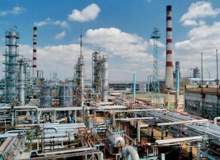
Saratov oil refinery is located in the city of Saratov, Russia. It was commissioned in April 1934 and can process 7mt of crude annually. The refinery manufactures a range of products including unleaded gasoline, diesel fuel, fuel oil, bitumen, vacuum gas oil, sulphur and naphtha.
TNK-BP is the operator of the refinery. It is owned by BP and the AAR Consortium (Alpha Group, Access Industries and Renova). About 1,680 employees are working at the refinery.
Extension of Saratov’s well established crude refinery
The refinery has been upgraded repeatedly over the years to enable production of new products and increase production capacity. Upgrades carried out from the 1950s to 1980s enabled the refinery to achieve a peak throughput of 10mt of crude.
In 2004, TNK-BP completed the construction of an 800,000t viscosity breaking unit. The unit was built to increase the refining depth to 70.75% and light oil product recovery to 53%.
The refinery had a capacity of 6.5mt in 2008. Following an upgrade in 2009, capacity was increased to 7mt.
TNK-BP announced its decision to invest $20m in environmental projects in 2010 to reduce pollution caused by the refinery. The projects include reconstruction of treatment facilities, expansion of the drainage system and land reclamation.
New equipment for storage tanks is also part of the investment. During the first half of 2010, new internal floating roofs were installed in five tanks of the refinery to reduce emissions by 6%.
TNK-BP also launched a $300m modernisation programme for the refinery in 2010 to be carried out between 2011 and 2012. The programme includes a series of equipment upgrades and reconstructions of existing units. These include construction of a new isomerisation plant, reconstruction of the diesel hydro treatment unit and sulphur unit, plus the rail loading rack for petroleum products.
The refinery started production of Euro-4 standard Ai-92 gasoline in September 2011. The modernisation programme will enable it to produce Euro-5 standard fuels.
In February 2012, the refinery’s reforming units L-35-11/300 and LCh-35-11/600 were equipped with new equipment as part of the modernisation programme. Reconstruction of the hydro-treatment plant was also completed. Construction of the isomerisation unit is expected to be completed by the end of 2012. It will have an annual capacity of 300,000t. The rail loading rack, originally built in 1999, is being reconstructed at a cost of $30m.
A new bitumen unit is planned to be added to the refinery at a cost of $74.7m. Construction of the new unit will be carried out between 2012 and 2014. Productivity of the vacuum desalter unit is also scheduled to be increased between 2012 and 2015.
These investments will enable TNK-BP to improve the quality of products manufactured at the refinery and also minimise its environmental impact.
Lab information management system (LIMS) at TNK-BP’s refinery
The refinery is equipped with a laboratory information management system (LIMS) which helps in monitoring the quality of products of the refinery.
LIMS is an integrated system which provides feedback on the quality across the refinery and eliminates errors in calculations.
Information provided by the system is quickly available to the technical personnel who can make changes accordingly. This reduces the time required and improves efficiency.
Contractors involved with the Russian oil refinery’s expansion
In July 2011, Invensys Operations Management was awarded a contract for automation of the refinery. Invensys will provide the refinery with its Foxboro distributed control systems and Triconex shutdown and critical control systems.
It will also provide its Foxboro measurement, instrumentation and control devices to be installed in the refinery’s isomerisation and other units.
Invensys is responsible for delivering, testing and commissioning the automation system. It will also provide training courses for operation and maintenance.
Marcon has been appointed as the general contractor for reconstructing the rail loading rack.
Intecsa provided basic engineering services for the refining units including the mild hydrocracking units, hydrogeneration, sulphur recovery, gas washing and liquid effluents treatment unit.



